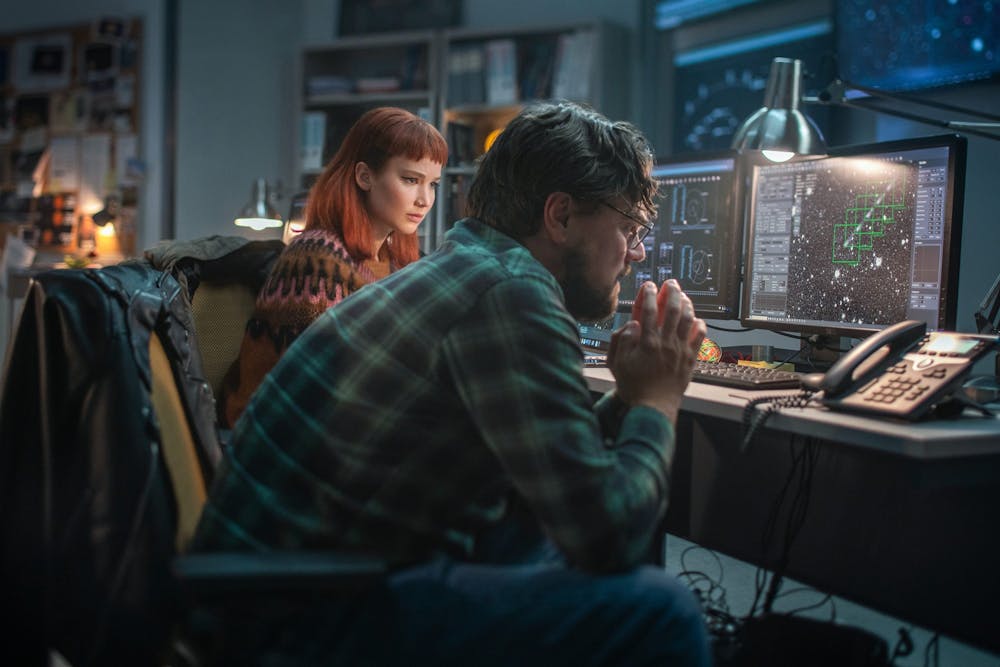Movie: “Don’t Look Up”
Release Date: Dec. 24, 2021
Director: Adam McKay
Runtime: 138 minutes
Genre: Comedy, drama
Columnist’s Rating: B+
The "end of life as we know it" genre of film is one that's been around for decades. "Don't Look Up" is unique from many other movies because it premiered after many of us lived through our world seemingly falling apart.
The stand-out characteristic of the film is its disregard for humanity's ability to save itself from — or even recognize — our impending doom. Most other films about humankind facing extinction end on a hopeful note. They encourage us that in the end, humanity will pull together and sacrifice to do what is best for us all.
This film, by contrast, is painfully grounded in our reality. If nothing else, the past few years have taught us that too often our fate is decided by the few, the greedy and the ignorant.
In "Don’t Look Up," a doctoral student (Jennifer Lawrence) and her professor (Leonardo DiCaprio) discover a massive comet that will destroy the Earth in six months.
As they attempt to warn the authorities to take action before it is too late, they find an apathetic and unaffected government, media and public. People politicize what should be done about the comet and question if it is even real. The effort to destroy the comet, which becomes hijacked by a tech-billionaire and political squabbles, ultimately fails despite public campaigning and organizing.
Alongside Lawrence and DiCaprio, Meryl Streep plays the idiotic U.S. President who campaigns on the titular “Don’t Look Up” slogan, encouraging voters to ignore the scientists. Mark Rylance plays a frightening conglomeration of Musk, Zuckerberg, Jobs and Bezos — the billionaires who stand for everything and fight for nothing.
We also are treated to performances from Cate Blanchett, Jonah Hill, Tyler Perry, Timothée Chalamet and Ariana Grande. Truly, it is rare to see so many names of this stature in one film, and they are all in top form.
The film has been widely interpreted as a commentary about the ongoing climate crisis and the lack of urgency it is given. It’s interesting to note that filming took place in 2020 as the COVID-19 pandemic became a global crisis and played out in the public discourse almost exactly like the approaching comet in the film.
Many have criticized the film and director Adam McKay as condescending or too heavy-handed. However, for those of us who have watched the world devolve into a bad "The Onion" article in these past few years, we are used to things being painfully on the nose, yet happening right in front of our eyes.
I know several people who would vote for President Streep, as she preaches that the dangers of the comet have been blown out of proportion. The discomfort of this is what makes the movie unforgettably fun and perhaps a little miserable.
I felt Lawrence’s pain as she stood aghast at politicians and television hosts treating the end of the world like a ratings issue. I felt it again when she came home to her parent’s house only to be told “no politics” at the door because her family supports the jobs the minerals in the comet may bring, if the government can succeed in hijacking it and its resources.
I can certainly relate to Chalamet skateboarding behind an abandoned fast-food restaurant, because what else is there to do when Jeff Bezos’ rocket doesn't knock the comet out of the sky? (Note: I can not skateboard.)
My favorite scene is at the end of the film, as the comet begins its final approach. Our protagonists sit around a dinner table and talk. They say they are grateful to be with each other now and that they “really tried.” The conversation remains about the coffee, as the character’s voices tremble and the ground begins to shake. They know any moment will be their last. Then the comet hits. It's all over.
What is there to say when the world ends around us and there is nothing we can do about it? This movie doesn’t offer any solutions. Maybe sometimes there aren’t any.

